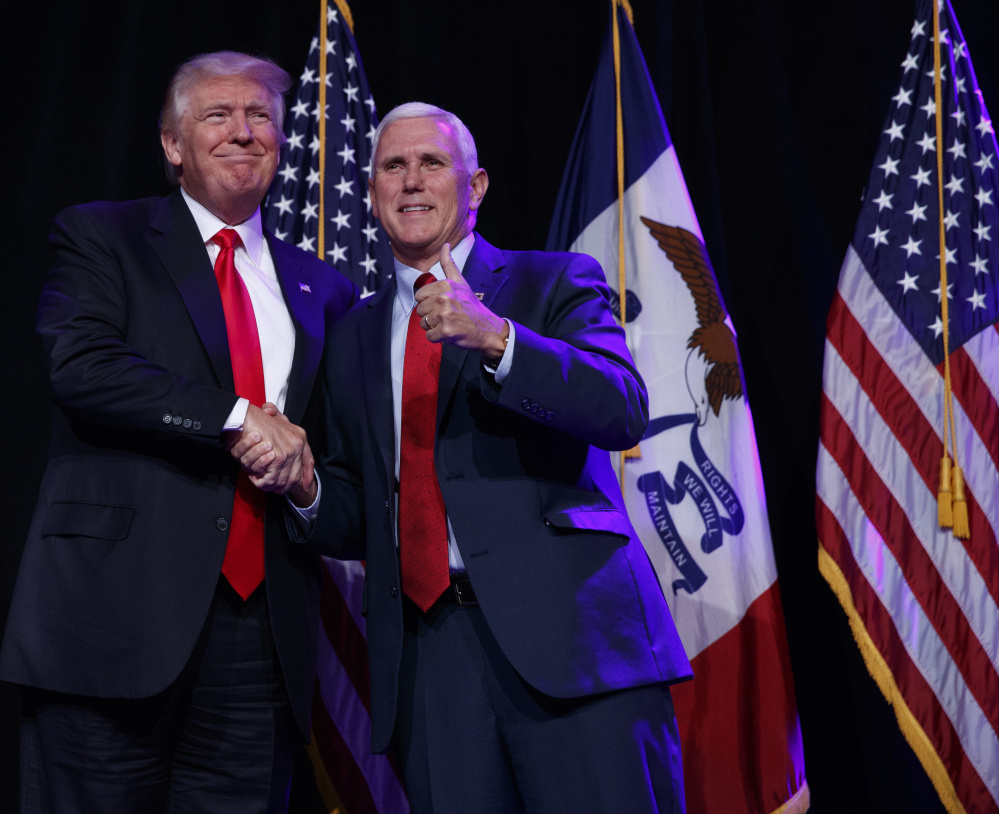Republican presidential candidate Donald Trump has stocked his economic team with wealthy financiers and billionaires, including some who have had close ties to his companies, in a move that brings a group of powerful businessmen inside his campaign but could also threaten his populist message.
The 13 outside advisers announced Friday include a banker who had loaned Trump’s casinos $600 million during their bankruptcies, as well as a hedge-fund manager who famously made a fortune betting against the U.S. housing market before the financial crisis. There are no women on the list.
In selecting a team on which the typical adviser is almost certainly worth hundreds of millions of dollars, Trump reinforced his pitch to voters that having already achieved financial success is critical to understanding what needs to be done to boost the U.S. economy. In a statement, he hailed “a formidable group of experienced and talented individuals” advising him, declaring, “I am going to be the greatest jobs President our country has ever seen.”
But the team drew criticism from liberal and conservative economists who said it badly lacked the policy expertise and economic credentials that have traditionally defined past Republican and Democratic campaigns.
“The purpose of having any economist on your campaign is it allows the candidate to be schooled on the issues, so if you get questions, you can be prepared to handle them,” said Greg Mankiw, a Harvard University economist who advised Republican nominee Mitt Romney in 2012 and served as top White House economist for President George W. Bush. “Trump doesn’t seem that interested in being conversant in issues,” he added, “so maybe, from his perspective, he didn’t need that kind of help.”
Mankiw said he will not vote for Trump, citing the nominee’s policies on trade and immigration. Trump’s team includes no prominent economists from the past several Republican campaigns or senior economic officials from previous Republican administrations. There is only one academic economist in the group and only one well-known tax policy expert.
Trump long led Democratic rival Hillary Clinton in polls on the question of who would better handle the economy, but that advantage has vanished following the parties’ national conventions. He has also sought to portray the economy as weak, though that could become more difficult in light of Friday’s hiring report, which said that the country added 255,000 jobs in July, higher than expectations.
Trump’s new economic team includes Harold Hamm, a self-made oil billionaire who was an energy adviser to Romney’s 2012 presidential campaign; Dan DiMicco, a former chief executive of steelmaker Nucor; Steven Mnuchin, Trump’s national finance director, who is chairman and chief executive of the hedge fund Dune Capital Management; Steve Roth, founder and chief executive of Vornado Realty Trust; hedge-fund billionaire John Paulson; Howard Lorber, chief executive of the Vector Group; real estate investor Tom Barrack; bankers Stephen Calk and Andy Beal; and financier Steve Feinberg.
Business ties link Trump and several of those men. It was Beal’s banks that loaned Trump $600 million during his casino bankruptcies, according to Bloomberg, and Trump once said Beal has “20/20 vision into what is going to happen in the future.” Barrack sold Trump the Plaza Hotel in New York for $410 million, shortly before the city’s hotel market cratered. Trump still called him “a totally brilliant guy.”
The only member who has a doctorate in economics is Peter Navarro of the University of California at Irvine, who focuses on trade with China and who three times ran unsuccessfully for public office in San Diego.
The leading tax expert is Stephen Moore, who founded the Club for Growth and was a longtime columnist for the Wall Street Journal. There is also a former U.S. Senate candidate, David Malpass, who served in the Reagan and George H.W. Bush administrations and who now runs an economic consulting firm.
On the campaign staff level, the team is led by policy director Stephen Miller, a former aide to Sen. Jeff Sessions, R-Alabama, and deputy director Dan Kowalski.
Justin Wolfers, a liberal economist at the University of Michigan, said the group undermined Trump’s promise to voters that he would assemble “the best people” to staff his administration. “This is the least distinguished, least qualified economic team of any candidate in my lifetime,” Wolfers said.
“If you said that what I had to do was only formulate an economic policy team exclusively of rich white guys who had business backgrounds and were all named Steve,” Wolfers added – referencing the names of six members of group – “I still wouldn’t choose Steves only from Wall Street, real estate and mining.”
A Trump spokeswoman did not respond to a request for comment on the criticism.
Send questions/comments to the editors.



Success. Please wait for the page to reload. If the page does not reload within 5 seconds, please refresh the page.
Enter your email and password to access comments.
Hi, to comment on stories you must . This profile is in addition to your subscription and website login.
Already have a commenting profile? .
Invalid username/password.
Please check your email to confirm and complete your registration.
Only subscribers are eligible to post comments. Please subscribe or login first for digital access. Here’s why.
Use the form below to reset your password. When you've submitted your account email, we will send an email with a reset code.